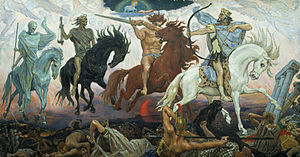My one-liner: Quite simply the best popular history book you will ever read. Astounding survey of historical forces that have shaped today’s world.
At the top of the front cover of this book, there is the following quote from Niall Ferguson: “The nearest thing to a unified field theory of history we are ever likely to see”. That is not far off the mark, and it would be impossible to do justice to the breathtaking breadth covered by this work in a short review.
There is much current debate the so-called catch-up of developing / emerging countries after several centuries of Western economic dominance. The West’s relative decline, exacerbated by the financial crisis, is personified by the projected overtaking of the USA’s GDP by China some time in the next 10-40 years, depending on which research you read. And in the world of finance and investment, this translates into debates around upcoming fast economic growth in emerging markets being a driver for superior investment returns. After a reading of Ian Morris’ book, that analysis seems less applicable as an appropriate framing for relative rise and decline. Because it forces the reader to think in much longer time frames. And to ask himself some different questions.
The book is an astounding synthesis of biology, geography, geology and socio-economic history, that surveys the ascent of humanity from pre-historic times until today. The style is both story and analysis. From Monty Python’s Life of Brian to Voltaire’s Pangloss (“All is for the best in all possible worlds”) to Alexander Pope (of Newton: “Nature, and Nature’s laws lay hid by night, God said Let Newton be ! And all was Light !) to Albert Einstein (“I do not know how the Third World War will be fought, but I can tell you what they will use in the Fourth – rocks”), there is enough literary, poetic, scientific and cultural commentary to keep any self-styled polymath reader happy.
Some central themes of the thesis.
The frame of reference is the evolution, over the last 16 millenia, of Morris’ Social Development Index. You can quibble, if you want, with the construction and the components (energy capture, organisation / urbanisation, war-making, and information technology), but what it serves to do is impose a consistent development measure across all time periods for the relative development of the West and East.
Throughout pre-history and history the index has swung in favour of either East or West for many centuries at a time. Geography (“maps”) and human progress (“chaps”) variously define which region takes the lead. Progress, is in Morris’ self-confessedly pithy theorem, “made by lazy, greedy, frightened people looking for easier, more profitable, and safer ways to do things.” The analysis thus looks to dismiss the notion that there is somehow a hard-wired ethnic or geographical lock-in of development capability for any one region.
The first sustained decline in social development in both West and East, began around 100CE and there was another one around 1000CE, as both regions hit what Morris refers to as a “hard ceiling”. Both periods were characterised, in Morris’ analysis by the prevalence, using the biblical analogy, of the “Five Horsemen of the Apocalypse”, namely climate change, famine, state failure, migration, and disease. The West spent most of the period from 1400 to 1800 CE catching up with the East, ending a 1200-year year reign of Eastern supremacy, and crucially, resulting in both regions breaking through the previous 1000CE hard ceiling. The last two hundred years ? We know the story. An unprecedented, acceleration in development for both regions, but a clear advantage to the West (the opening of the Atlantic trade route, the industrial revolution, European military power etc, etc), with its roots in an ex-ante highly probable chain of history stretching back to the twelfth century .
The surprising end to the book is less about whether China will now regain its superiority, although the projection is that it will, around 2103 at the latest, and we all kind of know that. With a further massive acceleration (from an index score of 900 to 4000) for both regions as new technologies and globalisation unlock development. This “Singularity” is borrowed from futurist Ray Kurzweil. It is “a future period during which the pace of technological change will be so rapid, its impact so deep…that technology appears to be expanding at infinite speed.”
The more ominous question is whether the world will instead enter a period of “Nightfall” (last flirted with in the Younger Dryas ice age period around 10,800BC), using the title of the novel by Isaac Asimov. Not only will the world hit another hard ceiling, but, like any crash after a big bubble, the next crash of humanity will be utterly destructive. Are the “Five Horsemen” amongst us again, as climate change threatens and the free transfer of technology increases the chance that devastating and dangerous technology can end up in the wrong hands ? Morris concludes that there will be no halfway house, no “silver medal”. Only one of Singularity or Nightfall will prevail.
Here is the wikipedia link for the book.


 RSS Feed
RSS Feed
